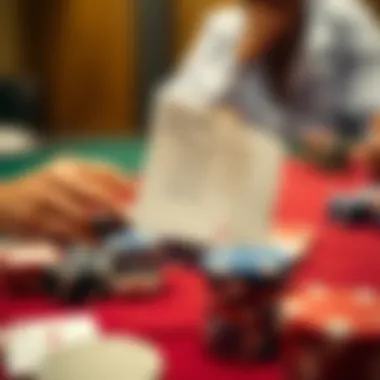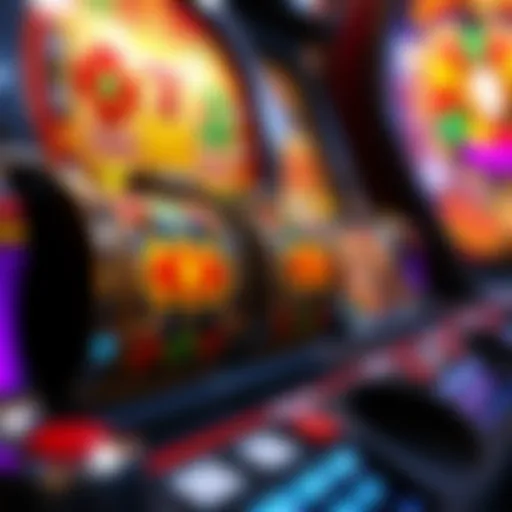Mastering Poker Math for Strategic Success


Intro
Poker is more than merely a game of chance; it’s a complex amalgamation of skill, strategy, and, notably, math. The fundamental mathematical principles serve as the backbone of effective poker play, guiding decisions, shaping strategies, and enriching the overall gameplay experience. Understanding poker math can elevate a player’s strategic thinking and decision-making skills significantly, whether you are a novice still learning the ropes or a seasoned player fine-tuning your approach.
In this article, we will dig into the critical concepts of poker math, focusing on its practical applications in gameplay. We will explore key literature that elucidates the relationship between mathematics and poker, including probability, expected value, and pot odds. By examining these foundational aspects, along with insightful poker books, readers can glean valuable information to sharpen their skills and enhance their strategic prowess. Let's embark on a journey through the fascinating world of poker math that shapes the way players engage with the game at every level.
Preface to Poker Math
Poker is not just a game of luck; it's a battleground where strategy, psychology, and mathematics intertwine. In this delicate tapestry, the thread of mathematics plays a crucial role. Understanding poker math can significantly enhance a player's decision-making process, shaping how they approach each hand. It is this very comprehension of mathematical concepts that separates the novice from the seasoned player, allowing the latter to navigate the uncertainties of the game with confidence.
The Importance of Mathematics in Poker
Mathematics serves as the backbone of poker strategy. It informs a player's ability to assess risks and rewards effectively. Without a solid grasp of the numbers, a player may find themselves chasing losses or making ill-fated bluffs. For instance, consider the concept of odds, where understanding the probability of completing a hand can mean the difference between winning and losing a significant pot. Poker math also involves calculations regarding betting sizes, pot odds, and overall game strategy.
- Risk Management: Knowing the numbers helps manage risks more effectively. Players can evaluate if the potential gains justify the wager.
- Informed Decisions: It leads to more informed plays, particularly in high-stakes scenarios where every chip counts.
- Psychological Edge: Solid math skills can provide a psychological advantage, allowing one to make reasoned decisions amidst the chaos of the game.
Ultimately, a thorough understanding of these concepts can transform one's gameplay, converting insight into advantage on the felt.
Overview of This Article
This article endeavors to provide a comprehensive look into poker math, breaking down its integral components and their applications. We will dissect various mathematical principles, including probability, expected value, and pot odds, making them accessible for all levels of play. Throughout the exploration, we will reference key literature to aid in deepening your understanding. You will find discussions of significant books that piggyback these concepts, alongside practical strategies for implementing them in your gameplay.
As we progress, this piece aims to not just inform but also inspire a greater appreciation for the mathematical nuance behind each decision at the poker table. By synthesizing these elements, readers can draw connections between the theory and practice of poker, enhancing their approach to this multifaceted game.
Fundamental Concepts of Poker Math
Understanding the fundamental concepts of poker math is like grasping the ABCs of the game itself. For players aiming to elevate their skills, appreciating these math principles isn’t just a nice-to-have; it’s essential. The nuances of probability, expected value, and pot odds can dramatically influence gameplay strategies and outcomes.
Let’s break this down into bite-sized pieces.
Probability in Poker
In poker, probability underpins almost every decision at the table. It helps players assess the likelihood of different outcomes based on their hands, board cards, and their opponents' likely holdings. Understanding these probabilities allows for more informed choices, which can be the difference between a hefty win and an unfortunate loss.
For instance, if you're holding a flush draw, calculating the probability of hitting your flush on the next turn can guide your decision on whether to call or fold.
Here are a few pointers on probability:
- Familiarize with outs: these are the cards that improve your hand. Knowing your outs helps you calculate your chances of victory.
- Use the Rule of 2 and 4: To quickly estimate your chances, multiply your outs by 2 for the next card or by 4 for the turn and river combined.
Understanding these numbers keeps you a step ahead during key moments in the game.
Expected Value Explained
Next up is expected value (EV), a term that might sound like gobbledygook at first but is truly a game-changer. Simply put, EV measures the potential value of a decision over time. It’s about evaluating whether a bet or fold will yield a positive or negative outcome in the long run.
To illustrate, suppose you bet $10 into a pot of $50, and there’s a 20% chance you’ll win the hand. The expected value of this bet can be calculated as:
- 0.20 (chance of winning) x $50 (size of pot) = $10
- And your cost to play is $10, so the EV is $10 - $10 = $0.
When the EV is positive, it indicates a profitable situation. But be careful; if consistently making negative EV decisions, you'll find your stack dwindling faster than you can say "all-in."
Understanding Pot Odds
Pot odds are crucial when gauging the odds of completing a drawing hand versus the odds offered by the pot when making a call. This concept breaks down the relationship between the current size of the pot and the bet you must call.
For example, if the pot is $100, and an opponent bets $50, the total pot becomes $150, while you need to invest $50 to continue. This translates to pot odds of 3:1. If your hand has a probability of winning that exceeds those odds, making the call is a good move.


Here’s a simple approach to remember pot odds:
- Calculate the total pot size.
- Determine the bet size you’re facing.
- Compare the two to see if the odds favor your potential hand completion.
Getting a grip on these fundamentals arms you with powerful tools for decision-making during a game of poker. They aren’t just numbers; they represent the very heartbeat of effective poker strategy.
"Mathematics is not just about numbers, equations, or algorithms; it is about understanding the world around us."
By digging deeper into these foundational concepts, players can significantly enhance their understanding, leading to better choices and, ultimately, better results at the tables.
Key Poker Math Books
The study of poker math can be a labyrinth for many. Without a solid repertoire of foundational texts, players might find themselves lost in the complexities of odds, strategies, and decision-making processes that the game entails. The importance of poker math literature cannot be overstated. These books serve not only to impart knowledge but also to sharpen one’s skills, providing insights that may lead to successful gameplay. Moreover, they create a bridge between theoretical understanding and practical application, which is essential for any serious player.
Mathematics of Poker by Bill Chen and Jerrod Ankenman
This book stands as a cornerstone in the realm of poker literature. Bill Chen and Jerrod Ankenman take a rigorous approach to the mathematical aspects of poker, offering readers a detailed exploration of how math underpins every decision made at the table. The authors dive into the fundamentals, explaining concepts with precision.
One key element is the focus on advanced probability analysis. They provide examples that challenge the reader to think critically about how to apply math in real-game scenarios. For instance, the authors illustrate how variance plays a role in long-term results, making it clear that winning a few hands does not necessarily lead to overall success.
Another noteworthy detail is their discussion on how to calculate expected value in various betting scenarios. By breaking down hands and giving thorough explanations, Chen and Ankenman equip players to make sound, like wise choices when faced with difficult decisions on the felt. The clarity with which they present complex ideas is commendable.
The Theory of Poker by David Sklansky
David Sklansky’s work is often revered as a must-read for any poker enthusiast who wishes to elevate their understanding of strategy. In this text, Sklansky covers a broad spectrum of topics, interweaving mathematical concepts with psychological insights that make poker not just a game of chance, but one of calculated skill.
One significant benefit of "The Theory of Poker" is its emphasis on the concept of implied odds. Sklansky goes beyond the standard pot odds calculations and discusses how future betting possibilities affect overall decision-making. This kind of depth can change how players approach their game, making them far more astute competitors.
The book also tackles the importance of playing styles and how to adapt strategies based on opponents' tendencies. A key takeaway here is the idea that an understanding of math can help players exploit weaknesses in their opponents. This blend of math with psychological strategy is what makes this work stand out and remain influential.
Poker Math That Matters by Owen Gaines
Owen Gaines offers a more focused view on the practical applications of poker math in "Poker Math That Matters." This text is particularly beneficial for players looking to make swift decisions in live play or online formats. Gaines simplifies complex equations and makes them accessible to a wider audience. His engaging writing style adds a layer of relatability, making math feel less daunting.
An element of this book that resonates with many readers is its straightforward approach to calculating pot odds and implied odds. Gaines uses real-life examples that demystify what can often seem overwhelming, ensuring that players can immediately implement strategies during gameplay.
Additionally, the author encourages practice, emphasizing that understanding theory is one thing, but executing it during play is another. He provides exercises and scenarios meant to reinforce learning and ensure that math becomes second nature to players. This practicality makes the book a valuable addition to any poker library.
"Mathematics in poker is not just about the numbers; it’s about making the right decisions at the right time." – Owen Gaines
By delving into these key poker math books, players can cultivate a robust understanding of the mathematical principles that shape the game. Each text offers unique insights and perspectives that cater to the needs of various learners, whether they are beginners or seasoned players looking to refine their strategies. Ultimately, engaging with these works not only enhances one’s game, but also fosters a deeper appreciation for the art and science of poker.
Applications of Poker Math in Gameplay
Understanding how to effectively apply the principles of poker math in actual gameplay is crucial for any player looking to enhance their skills. Math isn't just a dry collection of formulas; it's the backbone that rarely gets the spotlight but shapes every decision made at the table. By mastering these applications, players can gain a competitive edge that turns odds in their favor.
Bet Sizing and Its Implications
Bet sizing is far more than simply throwing out a random number; it’s a strategic maneuver heavily influenced by mathematical concepts. How much to bet in a given situation can often dictate the outcome of a hand.
- Key Considerations:
- Estimating the size of the pot.
- Opponent's tendencies and stack size.
- Your hand strength and board texture.
A player might assess the pot at $100 and decide that a bet of $50 could push their opponents out of the hand. However, bet sizing should reflect not just potential outcomes but also return on investment. If a player consistently under-bets, opponents might call too easily, which could diminish potential gains. In essence, learning the right bet-sizing can be thought of as dialing in the correct volume in a stereo system—too loud, and you risk alarming the competition; too quiet, and you won't get the attention you deserve.


"Effective bet sizing combines psychological tactics and mathematical logic. Master it, and you��’ll find yourself in a much stronger position at every table."
Making Informed Decisions Based on Odds
Being able to compute odds accurately is fundamental for any successful poker player. The essence of informed decision-making is rooted in calculating the odds not just of winning a hand but of various potential scenarios as they unfold.
- Types of Odds to Consider:
- Pot Odds: Comparing the current size of the pot to the cost of a contemplated call.
- Implied Odds: Considering future bets you might win if you hit your hand.
- Reverse Implied Odds: Evaluating future losses you might incur if your opponent has a stronger hand.
When faced with a decision to call or fold, determining pot odds can reveal whether the math supports the action you're about to take. For example, if the pot offers $150 and the bet to call is $50, the pot odds are 3:1, meaning you need to hit about 25% of the time to break even. By integrating these calculations into your thinking, you transform poker from a game of chance into a calculated risk, shifting your approach towards one steeped in theory and practice.
For further reading and resources to develop your poker math skills, you can visit:
Master these applications, and soon enough, you'll see how understanding healthily the math side of poker can become your ace in the hole.
Advanced Mathematical Strategies
When it comes to the world of poker, understanding advanced mathematical strategies is essential for any player looking to elevate their game. These strategies are not just mere numbers on a page; they are the backbone of a sophisticated approach to decision-making that can give players a tangible edge.
At its core, advanced mathematical strategies in poker often revolve around concepts like Game Theory Optimal (GTO) play and exploitative play. Each serves a unique purpose and understanding both is crucial in developing a well-rounded skill set. The key is to find that balance between their application depending on the situation at hand.
Game Theory Optimal (GTO) Play
Game Theory Optimal, or GTO, represents a style of play that aims to keep one’s strategy balanced, making it effectively unexploitable. In simpler terms, if your game aligns with GTO principles, your opponents can’t significantly profit from playing against you, no matter how good they are.
Benefits of GTO play include:
- Defensive Posture: GTO serves as a safeguard against opponents who might look to exploit other weaknesses in your playstyle.
- Structured Thinking: Adopting a mathematical lens promotes discipline, requiring players to think critically rather than emotionally during high-pressure scenarios.
- Predictability Control: While it aims to blend perfectly, it also creates a layer of unpredictability. Even the most seasoned players will often struggle to pinpoint your strategy.
However, GTO is not without its pitfalls. Players can find themselves too reliant on mathematical correctness, especially in games with soft competition where a more exploitative approach could yield far greater profits.
Exploitative Play Versus GTO
Exploitative play involves adapting one’s strategy based on the tendencies and mistakes of opponents, seeking to take advantage of weak patterns pronounced in their gameplay. In contrast to GTO's balanced approach, exploitative play is fluid, reactive, and often more profitable against particular player types.
Considerations when choosing between Exploitative play and GTO:
- Player Profiling: If you recognize that an opponent frequently overvalues hands, adjusting your approach to capitalise on this is a practical application of exploitative play.
- Risk and Reward Dynamic: Exploitative strategies can offer higher short-term rewards; however, they often come with increased variance. Alternatively, GTO strategies may lead to steadier, but potentially lower long-term returns.
- Skill Gap Acknowledgment: If you play against opponents significantly less skilled than yourself, aligning with exploitative strategies can be highly effective. Games with players knowledgeable in GTO concepts might force you back toward its techniques to maintain competitiveness.
In the complex world of poker, understanding and harnessing these advanced mathematical strategies can help players navigate the myriad layers of the game. Balancing your approach, knowing when to employ GTO principles versus exploitative tactics, could very well be the difference between mere survival in the poker arena and achieving consistent success.
Psychological Aspects of Poker Math
In the high-stakes world of poker, understanding math isn’t just about crunching numbers. It’s equally about the psychological factors at play. The intertwining of math and psychology helps players enhance their strategy, manage their emotions, and ultimately, their bankroll. Recognizing the human element of decision-making can often be the difference between winning and losing.
Balancing Math and Emotion
Every poker player knows that while the numbers provide a clear guideline, emotions can cloud judgment. The nature of poker, with its ups and downs, takes a toll on players.
- Emotional Reactions: When on a losing streak, one can often become rattled, making hasty decisions that derail sound poker strategies. This situation exemplifies the need to balance emotional reactions with mathematical reasoning.
- Rational Thinking: Incorporating math can act as a grounding force during these turbulent times. If a player knows the pot odds or asserts their expected value, they have a clearer rationale to guide their plays, even amid emotional chaos.
- Stress Management: Developing the ability to manage emotions not only boosts performance but also helps in preserving bankrolls. Techniques such as taking breaks or practicing mindfulness can help align emotional responses with calculated strategies.
In sum, successful poker players learn to embrace their feelings without letting them dictate their decisions. The integration of psychological aspects with mathematical understanding creates a more holistic approach to the game.


The Role of Confidence in Decision-Making
Confidence isn’t merely a buzzword in poker; it’s a decisive factor. The relationship between a player’s confidence levels and their performance can be profound.
- Calculative Confidence: When armed with a solid grasp of poker math, players tend to exhibit higher confidence in their decisions. If they understand their outs or the probabilities involved, they're more apt to commit chips to the pot without hesitation.
- Avoiding Overconfidence: Yet, overly confident players can fall victim to the traps of arrogance. Misjudging pot odds or failing to consider opponents’ moves may lead to costly mistakes. A confident player must also remain humble, continually questioning their calculations and seeking feedback.
- Building Confidence: One effective way to bolster confidence is through practice and retrospective analysis. Analyzing past hands, particularly those that didn’t go as planned, emphasizes learning moments and solidifies mathematical principles in the player's mind.
Learning Resources Beyond Books
As anyone who's dabbled in the world of poker knows, the journey of mastering this complex game doesn’t solely hinge on the written word. While books hold their ground as foundational resources, the landscape of poker education is now filled with diverse learning avenues that can provide invaluable insights and skills. Engaging with these resources can deeply enhance one's understanding of poker math and its practical applications.
Many beginners and even seasoned players often overlook the plethora of online courses, tutorials, software, and tools available. These resources not only complement traditional learning but also offer dynamic, interactive platforms that can adapt to an individual's specific skill level and learning pace.
Some benefits of exploring these resources include:
- Immediate feedback: Unlike reading, where one can sometimes misunderstand concepts, interactive platforms can test your understanding instantly.
- Real-time application of math principles: Many software tools help players analyze their gameplay as they go, reinforcing learning through practical application.
- Community engagement: Online platforms often foster communities where players can share experiences, strategies, and lessons learned.
In the ever-evolving game of poker, the importance of adapting and making use of various resources cannot be overstated. Players looking to sharpen their edge should consider all avenues — and that includes those that are not strictly book-related.
Online Courses and Tutorials
In today's digital age, the internet is teeming with online courses and tutorials that cater specifically to poker enthusiasts. Websites like Coursera or Udemy have courses that range from beginner basics to advanced mathematical strategies. These structured courses often distill complex concepts into digestible segments, balancing theory with practice through quizzes and assignments.
One such course might focus on probabilistic reasoning in poker, guiding students through scenarios they might face at the table. Here, emotional aspects of decision-making can also be interwoven with the math gamers need to master. Engaging in these courses brings another layer of understanding, allowing players to collaborate through forums or peer discussions, asking questions that arise from practical applications and finding solace in shared learning experiences.
Key Features to Look For:
- Interactive components like quizzes and live gameplay recordings.
- Peer discussions that create a communal sense of learning.
- Expert instructors who can provide insights based on extensive experience in the field.
These courses not only amplify knowledge but also foster a supportive environment where learning poker math becomes a collaborative journey.
Poker Software and Tools
There’s a whole toolkit available to the modern poker player that goes beyond what any book can provide. Software tools like PokerTracker or Hold'em Manager are indispensable for serious players. They supply comprehensive statistics on your own gameplay and that of your opponents, allowing you to adjust your strategies accordingly based on solid data. Here, math meets practical use.
Using these software tools, one can analyze various aspects of past games, assessing bet sizing, frequency of hands played, and other metrics that are critical for formulating strategies. They also sometimes incorporate built-in calculators to assess pot odds and equity, providing deeper insight into decision-making processes during actual plays.
"Poker tools have become a necessity; they allow you to keep up with the competition and improve your game exponentially."
Additionally, platforms like Flopzilla help players visualize board textures and calculate their hand equity against potential ranges. This visualization aspect can be especially beneficial for players who thrive on seeing those stats and probabilities laid out in front of them.
Essential Software Options:
- PokerTracker: Analyze your stats and improve your play over time.
- Hold'em Manager: Track opponents and develop counter-strategies based on their play style.
- Flopzilla: Calculate hand strengths and make informed decisions during play.
Exploring these tools expands the mind beyond theoretical concepts and urges players to apply their skills in real-world scenarios, enhancing their overall understanding of poker math.
Ultimately, learning resources beyond books are essential in developing a rounded, practical understanding of poker math. By embracing online courses and powerful software tools, players can pave a more informed and strategic path towards success at the poker table.
End
In wrapping up our exploration of poker math, it’s crucial to underscore the importance of this topic for anyone serious about improving their game. Poker, at its core, is not merely a game of chance; it incorporates complex calculations and logical reasoning that can significantly enhance a player's edge.
Final Thoughts on Poker Math
Mathematics pervades every aspect of poker, dictating strategies and outcomes. It’s like the backbone of the game, providing players with a framework to make informed decisions. Concepts such as probability, expected value, and pot odds are not just mere numbers; they are the lifeblood of strategic gameplay. Understanding these elements gives players the confidence to navigate through the randomness inherent in poker. For example, considering pot odds when deciding whether to call or fold can mean the difference between long-term success and failure. Without this understanding, one might as well be shooting in the dark. As one can see, integrating math into poker strategy is akin to adding fuel to a well-tuned engine; it makes everything run smoother and more efficiently.
Encouraging Continued Learning
The journey of mastering poker math doesn't have a final destination. It’s an ongoing process that involves continual learning and adaptation. The resources we've discussed, including books and online tutorials, serve as solid stepping stones. However, to fully grasp the concepts, one needs to actively apply them in real-world scenarios. Playing regularly is key, but so is reviewing one's own gameplay through software and other analytical tools. Keeping abreast of evolving theories and strategies in poker will also keep players one step ahead. Engaging with communities, such as those on Reddit or dedicated poker forums, can also provide fresh insights and foster discussions that challenge your current understanding.
By treating poker as both an art and a science, players can refine their approach and elevate their overall game. The interplay between math and psychology creates a rich tapestry that, when understood, empowers players to not only play smarter but also enjoy the game more deeply.



